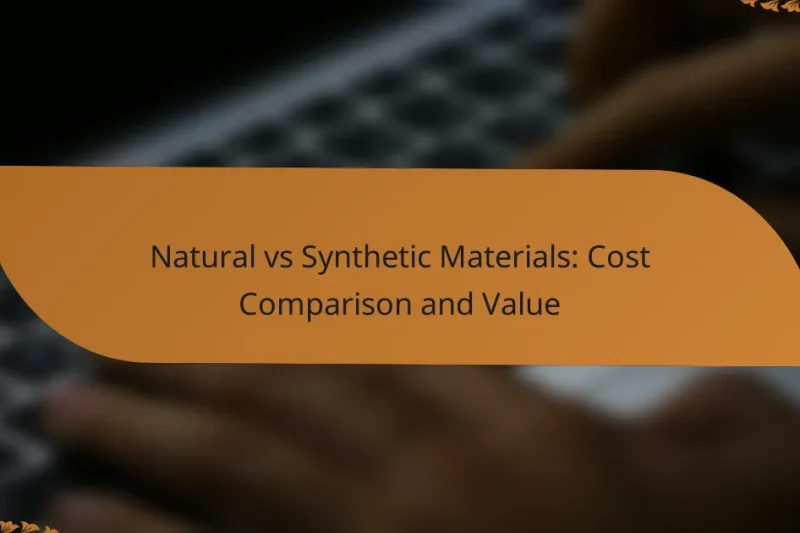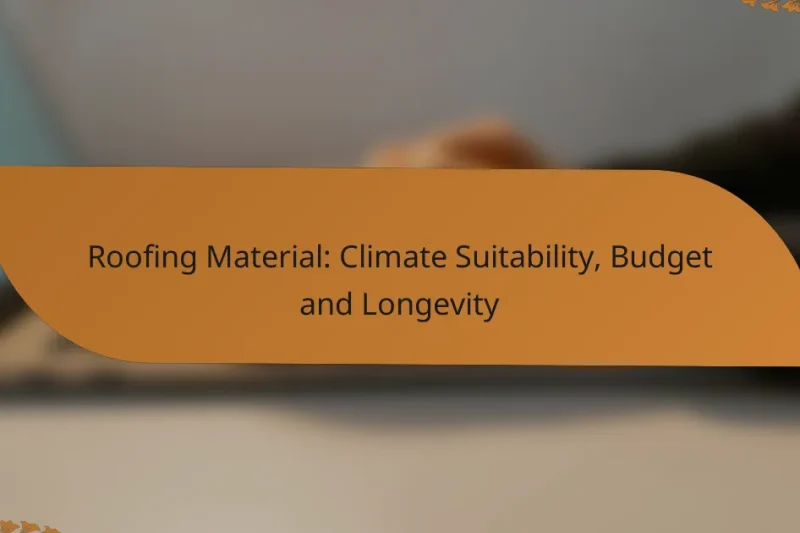When comparing natural and synthetic materials, cost plays a crucial role in decision-making, influencing both initial … Natural vs Synthetic Materials: Cost Comparison and ValueRead more
Home Renovation Materials
When embarking on a home renovation, selecting the right materials is crucial for achieving a balance of durability, aesthetics, and functionality. From kitchens to bathrooms, the choice of materials like quartz countertops and porcelain tiles can significantly impact both the look and longevity of your spaces. Additionally, opting for sustainable materials can enhance your home’s appeal while minimizing environmental impact.
Durable Flooring: Options, Features and Recommendations
Durable flooring is essential for maintaining a beautiful and functional home, with options like Luxury Vinyl … Durable Flooring: Options, Features and RecommendationsRead more
Energy-Efficient Windows: Features, Benefits and Installation
Energy-efficient windows are an essential investment for homeowners looking to reduce energy costs and enhance comfort. … Energy-Efficient Windows: Features, Benefits and InstallationRead more
Countertop Materials: Pros, Cons and Selection Tips
Choosing the right countertop material is crucial for both functionality and style in your kitchen or … Countertop Materials: Pros, Cons and Selection TipsRead more
Paint Selection: Types, Finishes and Color Choices
Selecting the right paint for your interior walls involves understanding the various types, finishes, and color … Paint Selection: Types, Finishes and Color ChoicesRead more
Sustainable Materials: Benefits, Types and Applications
Sustainable materials play a crucial role in minimizing environmental impact while enhancing resource efficiency and brand … Sustainable Materials: Benefits, Types and ApplicationsRead more
Roofing Material: Climate Suitability, Budget and Longevity
When selecting roofing materials, it’s crucial to consider your local climate, as each option offers unique … Roofing Material: Climate Suitability, Budget and LongevityRead more
What are the best home renovation materials for kitchens?
The best home renovation materials for kitchens combine durability, aesthetics, and functionality. Key materials include quartz countertops, stainless steel appliances, tile backsplashes, hardwood flooring, and various cabinet materials, each offering unique benefits and considerations.
Quartz countertops
Quartz countertops are a popular choice due to their durability and low maintenance. Made from engineered stone, they resist scratches and stains, making them ideal for busy kitchens.
When selecting quartz, consider the color and pattern options available, as they can vary widely. Prices typically range from $50 to $100 per square foot, depending on the brand and design.
Stainless steel appliances
Stainless steel appliances are favored for their modern look and longevity. They are resistant to rust and corrosion, which is essential in a kitchen environment.
When purchasing, ensure that the appliances fit your kitchen layout and consider energy-efficient models to save on utility bills. Prices can vary from a few hundred to several thousand dollars based on the brand and features.
Tile backsplashes
Tile backsplashes add both style and protection to kitchen walls. They are available in various materials, including ceramic, glass, and natural stone, allowing for creative designs.
Consider the ease of cleaning and maintenance when choosing tiles. Installation costs can range from $10 to $30 per square foot, depending on the complexity of the design.
Hardwood flooring
Hardwood flooring offers warmth and elegance to a kitchen space. It is durable but requires regular maintenance to prevent water damage and scratches.
Choose a wood type that suits your style, and consider finishes that enhance durability. Prices generally range from $5 to $15 per square foot, with installation costs adding to the overall budget.
Cabinet materials
Cabinet materials significantly impact both the functionality and aesthetics of a kitchen. Options include solid wood, plywood, and MDF, each with different costs and durability levels.
Solid wood cabinets are the most durable but also the most expensive, typically ranging from $100 to $500 per linear foot. Consider your budget and the kitchen’s overall design when selecting cabinet materials.
What are the best home renovation materials for bathrooms?
The best home renovation materials for bathrooms prioritize durability, moisture resistance, and aesthetic appeal. Key options include porcelain tiles, glass shower enclosures, water-resistant drywall, vanity materials, and quality faucets and fixtures.
Porcelain tiles
Porcelain tiles are a popular choice for bathroom flooring and walls due to their durability and water resistance. They come in various styles and finishes, allowing for creative designs while providing a non-porous surface that is easy to clean.
When selecting porcelain tiles, consider the PEI rating, which indicates their durability. A rating of 4 or 5 is ideal for high-traffic areas like bathrooms. Additionally, choose tiles with a textured surface to prevent slipping when wet.
Glass shower enclosures
Glass shower enclosures enhance the aesthetic of a bathroom while providing a modern look. They can create an illusion of space and are easy to maintain compared to traditional shower curtains.
When choosing glass enclosures, consider the thickness of the glass; 10mm is a standard thickness that offers strength and durability. Ensure the hardware is corrosion-resistant, especially in humid environments.
Water-resistant drywall
Water-resistant drywall, often referred to as green board, is essential for bathroom walls to prevent moisture damage. It is specifically designed to withstand humidity and is less prone to mold growth compared to standard drywall.
When installing water-resistant drywall, ensure proper sealing at joints and edges to enhance moisture resistance. It is advisable to use this type of drywall in areas directly exposed to water, such as around bathtubs and showers.
Vanity materials
Choosing the right materials for bathroom vanities is crucial for both functionality and style. Common materials include solid wood, plywood, and engineered stone, each offering different levels of durability and aesthetics.
Solid wood provides a classic look but may require more maintenance, while plywood is more resistant to moisture. Engineered stone countertops, like quartz, are non-porous and easy to clean, making them an excellent choice for busy bathrooms.
Faucets and fixtures
When selecting faucets and fixtures, focus on quality and water efficiency. Look for products that are certified by the WaterSense program, which indicates they meet specific water-saving criteria.
Consider the finish of the fixtures, such as chrome, brushed nickel, or oil-rubbed bronze, to match your bathroom’s overall design. Ensure that the faucet height and reach are suitable for your sink to enhance usability.
How to choose sustainable home renovation materials?
Choosing sustainable home renovation materials involves selecting options that minimize environmental impact while ensuring durability and safety. Focus on materials that are recycled, low in volatile organic compounds (VOCs), and energy-efficient to enhance your home’s sustainability.
Recycled materials
Recycled materials are an excellent choice for sustainable renovations as they reduce waste and lower the demand for new resources. Common options include reclaimed wood, recycled metal, and repurposed bricks, which can add character and uniqueness to your project.
When selecting recycled materials, check for certifications that confirm their sustainability, such as the Forest Stewardship Council (FSC) for wood products. Be mindful of the condition and treatment of these materials to ensure they meet safety standards.
Low-VOC paints
Low-VOC paints are formulated to emit fewer volatile organic compounds, which can improve indoor air quality and reduce health risks. These paints are available in a variety of colors and finishes, making them a versatile option for any renovation project.
When choosing low-VOC paints, look for products labeled with certifications like Green Seal or the EPA’s Safer Choice. It’s advisable to test a small area first to ensure the color and finish meet your expectations before committing to a larger application.
Energy-efficient windows
Energy-efficient windows help reduce heating and cooling costs by minimizing heat transfer. Look for windows with a high Energy Star rating, which indicates superior insulation and energy performance.
Consider double or triple glazing, low-emissivity (Low-E) coatings, and argon gas fills to enhance energy efficiency. While the initial investment may be higher, the long-term savings on energy bills can make these windows a cost-effective choice over time.
What are the costs of popular home renovation materials?
The costs of home renovation materials can vary significantly based on quality, brand, and local market conditions. Understanding the price ranges for popular materials like hardwood flooring, granite countertops, and vinyl siding can help you budget effectively for your renovation project.
Cost of hardwood flooring
The cost of hardwood flooring typically ranges from $3 to $12 per square foot, depending on the wood type and finish. Common options include oak, maple, and cherry, with exotic woods often costing more.
When considering hardwood flooring, factor in additional expenses such as installation, which can add $2 to $5 per square foot. It’s also essential to account for maintenance costs, as hardwood may require refinishing every few years.
Cost of granite countertops
Granite countertops generally range from $40 to $100 per square foot, including installation. The price can vary based on the granite’s origin, color, and pattern, with rarer stones commanding higher prices.
In addition to the material cost, consider the need for professional installation, which is crucial for ensuring proper fitting and support. Some homeowners may also choose to invest in sealing products to protect the granite from stains and scratches.
Cost of vinyl siding
The cost of vinyl siding typically falls between $2 and $7 per square foot, depending on the quality and style. Higher-end options may mimic the look of wood or stone, while budget-friendly choices offer basic colors and textures.
Installation costs can range from $1 to $3 per square foot, so it’s important to include this in your overall budget. Additionally, vinyl siding is low-maintenance and energy-efficient, which can lead to savings in the long run.
What are the latest trends in home renovation materials?
The latest trends in home renovation materials focus on sustainability, technology integration, and aesthetic appeal. Homeowners are increasingly choosing eco-friendly options, smart materials, and versatile designs that enhance both functionality and style.
Smart home materials
Smart home materials are designed to integrate seamlessly with technology, enhancing convenience and energy efficiency. These materials often include sensors and connectivity features that allow homeowners to control various aspects of their home remotely.
Examples of smart materials include energy-efficient windows that adjust tint based on sunlight, smart insulation that regulates temperature, and flooring that can monitor foot traffic. When selecting these materials, consider compatibility with existing systems and the potential for long-term savings on energy bills.
To avoid common pitfalls, ensure that any smart materials you choose are user-friendly and have reliable customer support. Research brands and read reviews to find products that are proven to perform well in real-world conditions.






